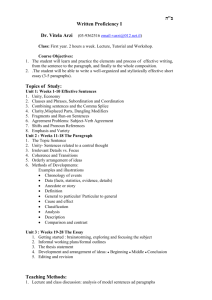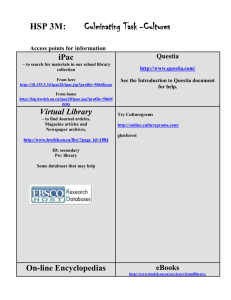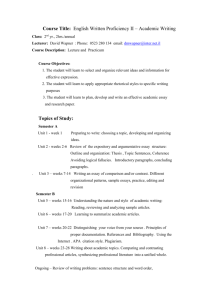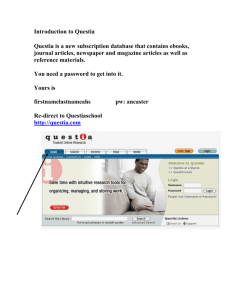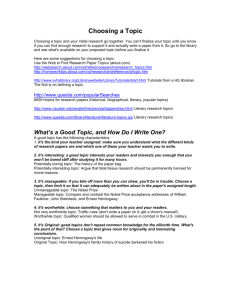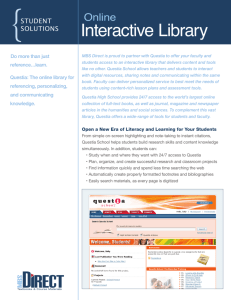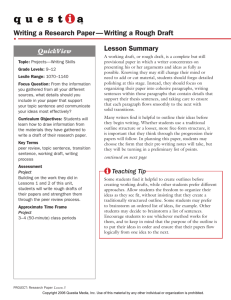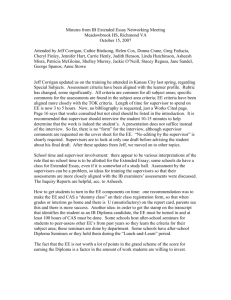To Questia Or Not to ... That Is the Question Doris Small Helfer
advertisement
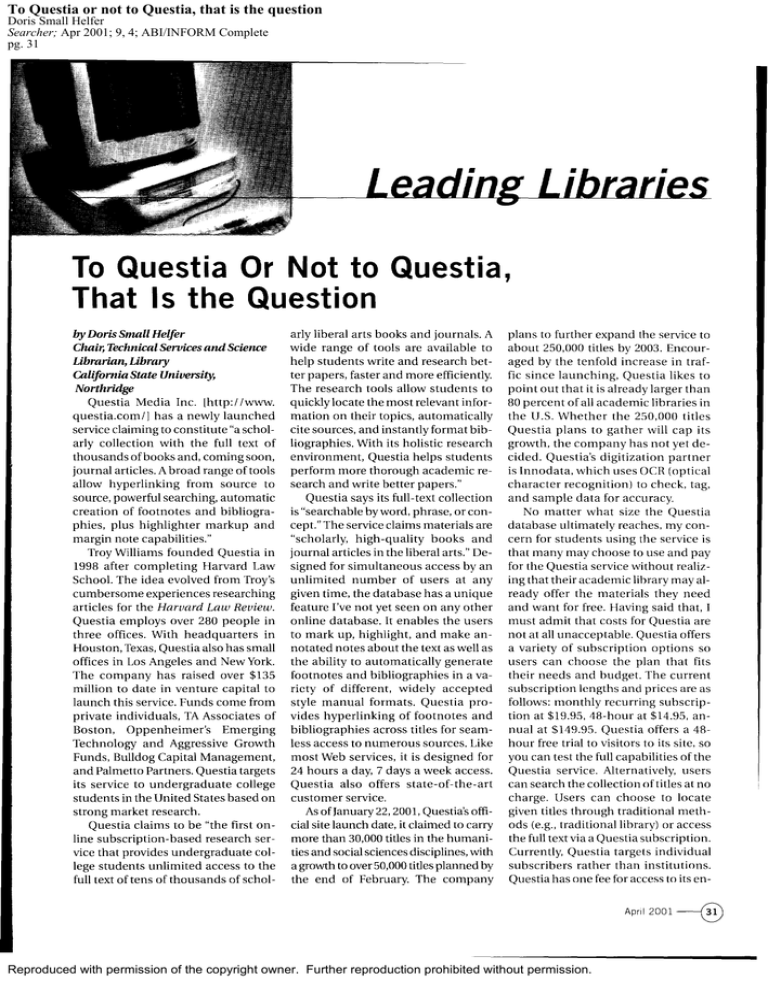
To Questia or not to Questia, that is the question Doris Small Helfer Searcher; Apr 2001; 9, 4; ABI/INFORM Complete pg. 31 To Questia Or Not to Questia, That Is the Question by Doris Small Helfer Clulir, Technical Services and Science Librarian, Libra~ California State University, Northridge Questia Media Inc. [http://www. questia.com/] has a newly launched service claiming to constitute "a scholarly collection with the full text of thousands of books and, coming soon, journal articles. A broad range of tools allow hyperlinking from source to source, powerful searching, automatic creation of footnotes and bibliographies, plus highlighter markup and margin note capabilities." Troy Williams founded Questia in 1998 after completing Harvard Law School. The idea evolved from Troy's cumbersome experiences researching articles for the Harvard Law Review. Questia employs over 280 people in three offices. With headquarters in Houston, Texas, Questia also has small offices in Los Angeles and New York. The company has raised over $135 million to date in venture capital to launch this service. Funds come from private individuals, TA Associates of Boston, Oppenheimer's Emerging Technology and Aggressive Growth Funds, Bulldog Capital Management, and Palmetto Partners. Questia targets its service to undergraduate college students in the United States based on strong market research. Questia claims to be "the first online subscription-based research service that provides undergraduate college students unlimited access to the full text of tens of thousands of schol- arly liberal arts books and journals. A wide range of tools are available to help students write and research better papers, faster and more efficiently. The research tools allow students to quickly locate the most relevant information on their topics, automatically cite sources, and instantly format bibliographies. With its holistic research environment, Questia helps students perform more thorough academic research and write better papers." Questia says its full-text collection is "searchable by word, phrase, or concept." The service claims materials are "scholarly, high-quality books and journal articles in the liberal arts." Designed for simultaneous access by an unlimited number of users at any given time, the database has a unique feature I've not yet seen on any other online database. It enables the users to mark up, highlight, and make annotated notes about the text as well as the ability to automatically generate footnotes and bibliographies in a variety of different, widely accepted style manual formats. Questia provides hyperlinking of footnotes and bibliographies across titles for seamless access to numerous sources. Like most Web services, it is designed for 24 hours a day, 7 days a week access. Questia also offers state-of- the-art customer service. As ofJanuary22, 2001, Questia's official site launch date, it claimed to carry more than 30,000 titles in the humanities and social sciences disciplines, with a growth to over 50,000 titles planned by the end of February. The company plans to further expand the service to about 250,000 titles by 2003. Encouraged by the tenfold increase in traffic since launching, Questia likes to point out that it is already larger than 80 percent of all academic libraries in the U.S. Whether the 250,000 titles Questia plans to gather will cap its growth, the company has not yet decided. Questia's digitization partner is Innodata, which uses OCR (optical character recognition) to check, tag, and sample data for accuracy. No matter what size the Questia database ultimately reaches, my concern for students using the service is that many may choose to use and pay for the Questia service without realizing that their academic library may already offer the materials they need and want for free. Having said that, I must admit that costs for Questia are not at all unacceptable. Questia offers a variety of subscription options so users can choose the plan that fits their needs and budget. The current subscription lengths and prices are as follows: monthly recurring subscription at $19.95, 48-hour at $14.95, annual at $149.95. Questia offers a 48hour free trial to visitors to its site, so you can test the full capabilities of the Questia service. Alternatively, users can search the collection of titles at no charge. Users can choose to locate given titles through traditional methods (e.g., traditional library) or access the full text via a Questia subscription. Currently, Questia targets individual subscribers rather than institutions. Questia has one fee for access to its enApnl 2001--@ Reproduced with permission of the copyright owner. Further reproduction prohibited without permission. 1i r"··~ ~ ,..,.~ ~· quest f 1 a • .. ... "' ... ~"'~ ~·l'<.lnrt" saV'~40% ali!al~n m~ ' v · 1"'111 · iillm I\ ll•lllVO Questia home page. tire collection, which includ es both copyrighted and public domain publications. In order to sign up for your free trial, you have to have Internet access and agree to the terms contained in the Subscriber Agreement. The free trial is time limited, subject to change or cancellation, and only one free trial per customer is offered. Quest ia claims "the service ca n improve the way your students approach and write research papers" and that it is "an indispensabl e tool for students who want to do better research and write better papers. Wh en your students gain access to the full text of tens of thousands lib e ral arts books and journals in the Questia collection, as well as use the powerful suite of research and citation tool s, they'll perform more thorough research and create better papers with richer bibliographies. This is because your students will have rapid access to a wider selection of res ea rch sources than ever before. All titles in the Questia collection are hyp erlinked through footnotes and bibliographies to other works in the co llection so students can 'move' quickly from one text to another within their research topics. Ease of researching with the Questia service can motivate students to use a broader range of resources and spend more time reading and thinking about the meaning of the materials they've found through the Questia service, and thus create better papers." Questia claims that "citation tools allow students to generate footnotes and bibliographies automatically, making it easier for the student to correctly cite a referenced work." This ultimately helps reinforce proper citation guidelines, as many students do not always know when a citation is required. Questia claims its "service is designed to allow students to spend more time on critical thinking and less time on research," presumably by giving them quick full-text access to the text of books and journal articles electronically online. Questia staff includes "professional librarians with years of experience in academic collection development who select titles for the Questia collection. Dr. Carol Ann Hughes, with over 25 years experience in managing academic library collections and digital technologies, manages the Questia staff of collection librarians. Dr. Hughes and her staff also consult with an advisory group of university librarians and faculty to ensure that the Questia collection is a vital scholarly resource. Collection coverage is co ntinually reviewed using a mixture of traditional and innovative techniques." Questia "ensures th at the electronic versions of all books mirror the original pagination to the fullest extent possible. The highest level of accuracy and integrity of digiti zed titles is maintained at all times." Many of the titles are selected because of special reports Questia was able to get from a variety of library- related vendors as to the most commonly purchased books in academic libraries, as well as from recommended lists a nd its own statistics as to most frequently asked for types of materials. When I asked about journal coverage, these collection decisions too were based on demand. Questia does not assure its users that any journal has full coverage back to a certain date. Journal articles will also be selected on the basis of demand, potential for usage, and/or some recognition of the article's significance or worth in belonging to the Questia collection as determined by Questia's collection development librarians . Questia's service claims to include "scholarly books and, coming soon, journal articles written in the English language to support an undergraduate curriculum in the liberal arts (subjects such as History, Philosophy, Economics, Political Science, English and Literature, Anthropology, Psychology and Sociology). It excludes textbooks and titles in business and the hard sciences. Questia carries both fiction and non-fiction titles. Titles are chosen to support undergraduate coursework in the Liberal Arts. If you are interested in a specific title, searching on Questia does not require a subscription, and you can quickly see if Questia has the publication you are looking for." Questia states its "goal is to develop a collection that provides substantial coverage of high-quality information for most post-secondary core curriculum course assignments. A well-balanced collection has strong retrospective content, evidenced especially through citation links, as well as new titles. As works are constantly being added to the service, an exact figure is not available." To get some examples of titles included in the service Questia suggests that "you can perform a search by topic, author, title, or publisher. Searching the Questia service and viewing the list of search results are free of charge to anyone. New titles will continu e to be added based on their importance and usefulness to undergraduate students in the liberal arts." Questia assures users that it "is not design ed to be a digital library, or a substitute for a brick-and-mortar library. but rather is designed to make an extensive collection of titles andresearch tools available online to undergraduate students. We believe that physical libraries (and their librarians) @---sEARCHER: The Magaz1ne fo r Database Professionals Reproduced with permission of the copyright owner. Further reproduction prohibited without permission. will continue to play a key role in the future of research and education. We expect that Questia will enhance the library experience for students by giving them another tool to help perform their research. The Questia search function alone - to be offered at no charge to any user- allows a librarian to find the exact volumes and pages that can answer a student's question, thus saving dead-end trips to the stacks." Having disclaimed being a digital library, however, Questia also states that it has "undertaken the largest digitization project in the world to provide users with more than 50,000 titles of books and journal articles selected by Questia's staff of professional librarians." Whether this effort constitutes "the largest digitization project in the world" may be disputed, for example, by the Library of Congress, but there is no doubt that it represents a major undertaking by a commercial company. I suspect that although Questia targets the undergraduate college market, the company may indeed attract considerable use and interest from people trying to do research on topics of interest whether or not those potential users are enrolled in a college or university. In my institution, for instance, we have a lot of community members who come to use the library when they need to find information on a topic. The ability to access books electronically for those not near a campus should also be of some interest. Questia claims that "individual titles are selected on the basis of what they add to the overall collection rather than because they appear on a state list. We have no plans at this time to include rare or special collections material or manuscripts. Works of art will be included if they are part of a text, but not as individual items." Questia has sufficient number of titles to support a wide range of undergraduate research topics. While the database may not have as many volumes as some of the larger university libraries, titles chosen for inclusion do offer important sources for undergraduate students in the liberal arts. To date, Questia has signed over 160 publishers, ranging from commercial houses to university presses. The list includes such presses as Oxford University Press, Columbia University Press, Academic Press, and Harvard University Press. IThe complete list is available at http: I /www.questia.com/ partnerpage_publishers.jsp.l Questia prefers to deal with publishers, although it will consider dealing with authors in certain cases where the author owns the copyright to his or her book. In some cases, Questia has contacted authors at the request of their publishers. Questia has signed some authors, but does not disclose the names or number. Questia does not accept original manuscripts, not being a first-run publisher. Questia's collection development staff identifies titles for purchasing and tries to obtain the electronic rights. If electronic rights are not avail- dia, Inc.'s Librarian Advisory Council includes inaugural members of the Librarian Advisory Council. all leaders in the field oflibrary and information science. The distinguished members include Rhoda Channing of Wake Forest University, Barbara Doyle-Wilch of Skidmore College, Mari Miller of the University of California, Berkley, Ann Okerson ofYale University, John Lubans of Duke University. Sue Phillips of the University of Texas, and Julie Todaro of Austin Community College. Questia's Service Go to Questia's home page and click on "tour" to get a demonstration of the service. The system also offers extensive, feature-specific help information throughout sessions. Users can search the entire collection for a word, phrase, or concept and quickly find the most relevant publications. They can also track useful information in these documents by bookmarking, annotating, Questia has a "Librarian Advisory Council" which consists of highly credentialed librarians from a variety of academic institutions. able, then Questia will not add the work to its collection. If the electronic rights can be obtained, Questia purchases actual hard copies of the books from a variety of booksellers; some publishers provide hard copies of their titles to them. Questia has a "Librarian Advisory Council" which consists of highly credentialed librarians from a variety of academic institutions. The council provides feedback on the service and input on ways Questia can interact with the library and academic community. The council will be instrumental in supporting and identifying current trends and issues in higher education and librarianship. Questia Me- and highlighting them online. These personalized notes, saved on the Questia service, will hyperlink back to the referenced information, allnwing users to easily organize and return to their work. To assist students in correctly attributing referenced materials, the Questia service creates, with just a few clicks, properly formatted citations such as footnotes and bibliographies in a variety of styles such as MLA Handbook or Chicago Manual of Style. An integrated encyclopedia, dictionary, and thesaurus provide instant access to background information. An online notepad acts as a handy spot to capture thoughts, even when the user isn't at their home PC. April 2001 Reproduced with permission of the copyright owner. Further reproduction prohibited without permission. -@ There are several ways to find the most relevant book, article, chapter, page, sentence, or phrase quickly and easily. Users can locate a specific book by simply entering the title, author, ture. These formats represent the primary ones used by undergraduate students for Humanities and Social Science research papers. Subscribers can not download whole books because Questia's research tools allow the user to personalize their research and save all their work in their private space on the service. publisher, etc. They can search by subject, utilizing a subject-tree list based on Library of Congress classifications. Finally they can do a powerful search of all the titles in the collection. With one click, not only can they find the full text of each source on their search results list, they can also navigate quickly inside the texts using internal reference links, such as the table of contents and indices. Questia has combined industry standard authority sources of library indexing with a proprietary search technology and created a system that greatly increases the opportunity to find relevant information within the collection. All of the traditional search criteria (i.e., title, subject, author, ISBN, publisher, etc.) are supported, as well as opportunities to see relevant subjects in search results created through a proprietary technology. Boolean, right-hand truncation, and adjacency features are supported, with further search features available in Power Search. Customers have three choices for searching the Questia collection: a Quick Search, to get a broad range of results; Power Search, for advanced searching on a specific or narrow topic area; and Explore by Topic, to browse the Questia collection by academic category The Questia service supports MLA, APA, Chicago Manual of Style, ASA and Turabian citation formats. Questia expects to add the APSA format in the fu- Questia will only serve up one page at a time to a user. Users cannot download any pages from the server; they can only print the one page they are viewing. Subscribers can only print up to 30 pages. This approach is designed to protect publisher rights and is one of the reasons I believe that publishers are willing to work with Questia. It gives publishers an additional market for their materials, and because Questia does not offer institutional subscriptions, the publishers probably do not view them as challenging librarybased revenues. To access the service, users need either Microsoft Internet Explorer 5.5, Netscape Navigator 4.75, or AOL Netscape 6.0. The service does not currently support the Macintosh environment, though it does have plans to support Macintosh computers in the future. Questia has a Customer Contact Center to support the service and ensure customer satisfaction. In addition to the online Help functions, customer support is offered over the phone, via e-mail, and via live agent chat, all available 24/7. Questia welcomes suggestions and feedback regarding the service. In the "Contact Us" place on the Web site, you can locate a form for submitting your feedback to Questia. Questia also claims it is "committed to ensuring that its electronic versions mirror their original print versions to the fullest extent possible. Specifically, all electronic texts in the Questia service replicate original pagination and line breaks. In addition, Questia is vigilant about ensuring the highest level of accuracy and integrity of the scanned titles. All original illustrations, graphs, and tables are included on the service if we have been able to acquire appropriate licensing rights." The Questia academic categories were developed by assessing the subjects covered by the collection and how students describe their research topics. Titles are assigned to categories based upon their Library of Congress classification number (the basis of a book's call number). A title can be in more than one category. Questia does not publish a list of all titles on the service. To see if a title is on the service, you can do a search (which is free to everyone). You can also do a free search to see what books and, coming soon, journal articles are available on specific topics. Questia's research tools allow the user to personalize their research and save all their work in their private space on the service. A personal account is therefore more appropriate than institutional access. Questia does not allow more than one individual at a time to access a subscription account. Users may use the service from anywhere, but Questia does not currently own international rights to some of the works on its service, which may prevent you from seeing some books outside of the U.S. At this time Questia only accepts U.S. currency. However, if you pay by credit card, your bank will exchange the currency. A subscription to Questia enables you to access the entire collection, which enables a richer research environment and allows you to link between publications in multiple academic categories. Privacy Questia uses personally identifying information about subscribers to improve content and product offerings, to statistically analyze site usage, to @--sEARCHER: The Magazine for Database Professionals Reproduced with permission of the copyright owner. Further reproduction prohibited without permission. customize site content, layout, and services, and to improve marketing and promotional efforts. Questia may also use your information to deliver information to you targeted to your interests, such as new services, promotions, and targeted advertisements. Review its Privacy Policy on the Web site. Questia claims to take customer privacy very seriously. Subscribers may choose not to receive any communications from Questia, except those relating directly to an individual's account status. This option is part of the registration process and can be updated at any time from the accounts section of the Questia Web site. Questia also promises, "Absent legal requests or someone gaining unauthorized access to your account, no one will be allowed access to private account information. Questia analyzes subscriber usage in order to determine how to improve its service, but will not share any information about individual subscribers with any partners. Disclosure of information is outlined in its Privacy Policy. Questia states it "does not control the privacy policies of third parties, you are subject to the privacy customs and policies of that third party. Questia encourages you to ask questions before you disclose your personal information to others. Questia cannot divulge any information about subscribers or their activities on our service, though some information may be provided to third parties in accordance with our Privacy Policy." Questia is committed to the security of its online titles and to protecting publishers' intellectual property. To that end the company has taken stringent measures to prevent pirating and illegal dissemination of copyrighted materials. Servers are systematically monitored to prohibit unauthorized automatic programmed access. Conclusion After I started researching Questia, I became much more enthusiastic for several reasons. First because I realized that I was acquainted with Dr. Carol Hughes over 20 years ago and this gave me a wonderful opportunity to re-connect and catch up with her. I also respected Carol enough to know that she would not lend her good name and hard work to an effort she didn't truly believe in. In another "its a small world" incident, the Associate Dean at my University (CSU Northridge), Susan E. Parker, came from the Harvard Law School and does indeed remember Troy Williams from his days there and how frustrated he was at not being able to find books online. While most of us would have said, "Oh well, I guess I don't get the book then," it obviously bothered Troy Williams enough to do something serious and major about it. It was bound to happen that someone would look at the large volume of print books and wonder why they aren't all available and searchable online- or at least the good ones! Questia in no way sees itself as a compelitor to netLibrary and other e-book vendors, but rather is attempting to fill a niche and provide a useful service in the liberal arts. The market will ultimately decide the fate of Questia. If students and others like and continue to use this service, then it will succeed. I do think Questia has done lots of things correctly in setting up this service, but large numbers of businesses have great ideas that still fail. I wish them success because Questia has hired librarians who do know how to find the best materials for such a collection. Questia exhibits at library conferences and is clearly trying to get its message to libraries and librarians. I only hope that students continue to know that they may have options outside of services like Questia where they can still go and get information without incurring direct costs- namely from their public or university library. * It's a New Game Out There More women play games online than men, according to a survey by PC Data Online, by a narrow point-4 percent margin (50.4 percent), though in combined online and offline gaming, men still hold a lead at 55 percent. In first-person shooter games, sports games, and strategy games, men are three times more likely to make up the gaming population. Women seem to favor online gambling, board and card games, quizzes, and trivia games. Apri I 2001 Reproduced with permission of the copyright owner. Further reproduction prohibited without permission. --@
